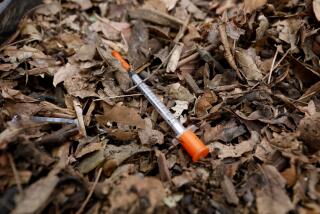Needle Programs Are Needed
- Share via
Understandably uneasy with government agencies giving drug addicts needles and other paraphernalia, Congress prohibited federally funded needle exchange programs in 1988. The ban could be lifted, Congress said, only when there was proof that such programs reduced the transmission of the AIDS virus without increasing illegal drug use. That time has come.
Since 1993, several major government-funded studies have shown that the programs that give addicts clean needles in exchange for tainted ones decrease HIV infection in injected-drug users by 30%, increase the likelihood that addicts will enter drug treatment programs and do nothing to lead nonusers into drug habits. But, unlike most developed nations, many U.S. state laws and federal law prohibit government from supplying clean needles. (California does not prohibit private programs, but Gov. Pete Wilson has thrice vetoed bills that would have legalized such programs.)
On balance, the prohibitions cost lives and money. Most of the 41,000 new HIV infections each year occur among injected-drug users and their sexual partners and children, federal disease control officials say. The average cost of lifetime care for those infected with HIV or suffering from AIDS is about $120,000; each sterile needle costs 10 cents.
Citing what both called “an urgent public health need,” the American Medical Assn. and the U.S. Conference of Mayors have called for revocation of the 1988 law and of similar state laws prohibiting needle exchange programs. In a resolution sponsored by Los Angeles Mayor Richard Riordan and San Francisco Mayor Willie Brown, the Conference of Mayors went further, urging Health and Human Services Secretary Donna Shalala to use her authority to permit federal funding for needle exchange.
Reflecting the conventional wisdom in Washington, conservative public policy analyst Gary L. Bauer says the idea of lifting the ban on needle exchange is unthinkable for President Clinton because it “strikes the average voter in the gut as being against common sense.” But recent polls suggest otherwise: A Kaiser Family Foundation survey issued last year, for example, indicates that 66% of Americans support needle exchange programs.
Washington should stop worrying about potential objections and start listening to the civic leaders and public health experts who have seen close up how the programs can be an effective and inexpensive way of preventing a deadly disease from spreading.
More to Read
Sign up for Essential California
The most important California stories and recommendations in your inbox every morning.
You may occasionally receive promotional content from the Los Angeles Times.












